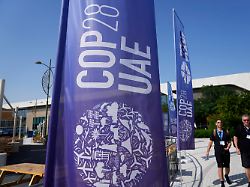Host Dubai very restrictive
Activists worry about their freedom before the climate conference
November 28, 2023, 3:00 p.m
This year’s UN climate conference will take place in Dubai. The host boasts that it will be the “most inclusive” gathering of its kind. However, activists who want to demonstrate on the site fear reprisals. There is great criticism about the lack of human rights.
According to the host country United Arab Emirates (UAE), the UN climate conference in Dubai (COP28) is set to be the most “inclusive” world climate conference ever. Human rights activists are looking forward to the conference that begins on Thursday with an uneasy feeling. “We are deeply concerned that people are being detained,” said Asad Rehman, spokesman for the Climate Justice Coalition. In the UAE, unauthorized demonstrations and criticism of those in power can result in drastic penalties.
“We are also concerned about the extent of surveillance. We know that the UAE has the technology to control digital communications,” says Rehman. The Emirates assured that environmentalists would be allowed to “meet peacefully” in certain areas of the conference site – a huge complex in the middle of the desert – during COP28. But this promise cannot calm activists.
Any criticism of the country and structures is prohibited
The UAE is an autocratic federation of seven sheikhdoms, Dubai being one of them. Any statements that could cause social unrest are prohibited. Insults, even in private, can be prosecuted. Homosexuality is illegal. “There are no parties in the Emirates, no trade unions, no independent civil society,” says Susann Scherbarth from the German environmental protection organization BUND.
In 2020, according to the human rights organization Human Rights Watch (HWR), a Jordanian living in the Emirates was sentenced to ten years in prison for criticizing Jordan’s royal family and government on Facebook. According to HWR and Amnesty International, at least 64 Emiratis are in prison for political reasons.
One of those detained is Ahmed Mansur, who is considered the Emirates’ “last human rights defender” and who openly criticized those in power. He was arrested in 2017 and sentenced the following year to ten years in prison for allegedly spreading false information on online networks and damaging the state’s reputation. “The United Arab Emirates has repressed all forms of civil society by imprisoning Emiratis who express even the slightest criticism,” says Devin Kenney of Amnesty International.
Conference participants should respect “social values”.
On the United Nations COP28 website, guidelines written by the host country note that local laws “prohibit the dissemination (…) of false reports or defamatory statements orally or through social media.”
A document aimed at conference participants from the LGBTQ+ community calls on “all visitors and residents to respect the cultural and social values” of the country. Another document has now been deleted again. It recommended journalists not to publish information that could “directly or indirectly insult the ruling regime” or “undermine national unity and social cohesion.”
Fear of telephone surveillance
“It is not the first time that a COP meeting has been held in a highly repressive state,” says Kenney. Last year the climate summit took place in Egypt, where demonstrators and government critics were repeatedly arrested. However, the Emirates are “much more sophisticated and perfectionistic” than Egypt when it comes to monitoring civil society, says Scherbarth. She also fears that the phones of COP participants will be monitored.
This year, protests will be limited to the “blue zone,” the COP28 site, which is under the jurisdiction of the United Nations, not the Emirates, during the November 30-December 12 conference. “For security reasons, no actions or civil society events will take place outside the site,” says Rehman.
But the activists will not give up protesting. They want to denounce the treatment of migrant workers, the imprisonment of civil society actors and the massive extraction of fossil fuels – all taboo topics in the Emirates. “But without human rights there will be no climate justice,” says Rehman.
